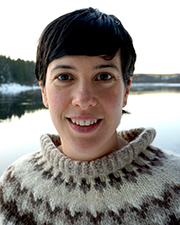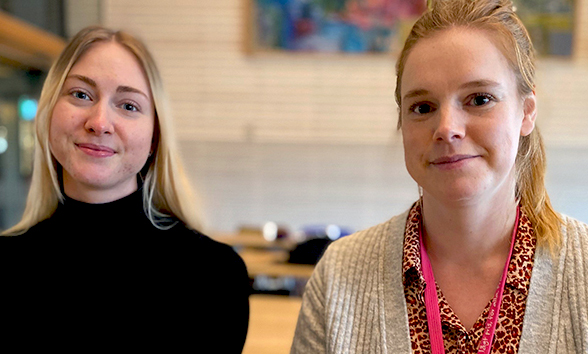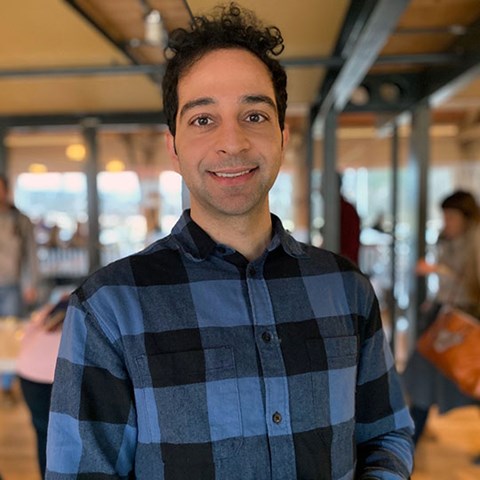One Health is about animal health and human health and how they interact with our environment. The program had a wide range of research areas with speakers from various parts of SLU and other universities and authorities.
"Our goal for the day was primarily to high light the full breadth of the One Health perspective and to demonstrate that we here at SLU have significant expertise in the field," says Susanna Sternberg Lewerin, program manager for SLU Future One Health. "Together with researchers in human medicine, we can really make a difference. And if we can get more SLU researchers to feel at home with the concept and contribute to more interdisciplinary collaborations and successful research applications, we will be happy. Then we have created value by facilitating this type of activity," Susanna says.
The diversity in One Health research is impressive
Hussein Khalil, a researcher at the Department of Wildlife, Fish and Environment, was also one of the speakers and talked about "Wild Animals as Disease Vectors". Hussein's research focuses on interdisciplinary and nature-based methods to improve health, particularly in urban environments with low incomes.
How is your research related to One Health?
"My colleagues and I are trying to understand how animal species that carry pathogens of importance to public health interact with each other and with the environment. We also investigate where, how and when people are most exposed to these animals and their pathogens. With this knowledge, we seek solutions that improve animal health, environmental conditions, and human health in a broad sense," Hussein explains.
Any highlights from the day?
"The diversity in One Health research at SLU is impressive, both in terms of the tools/disciplines involved, but also in terms of different study systems and geographic spread," says Hussain.
Anything new about the One Health concept that you didn't know or think about before?
"I hadn't thought much about plant health before, so it was interesting to learn how soil and plant health are connected to human health," says Hussein.
Hussein was also inspired to use green areas as a "healing" tool in low-income communities. He also believes that the One Health perspective can be advantageous in attracting research funding.
"I hope that research councils become even more aware of the conditions, that is, what is required to succeed with interdisciplinary projects within One Health. It takes a lot of time and trust before you can even start researching together and creating value," says Hussein.
 Aida Bargues Tobella is a researcher at the Department of Forest Ecology and Management. Aida is also the hub coordinator in Umeå for SLU Future One Health and was involved in organising the day.
Aida Bargues Tobella is a researcher at the Department of Forest Ecology and Management. Aida is also the hub coordinator in Umeå for SLU Future One Health and was involved in organising the day.
"I think that this broad commitment across faculties and departments reflects the development of the concept of One Health and the increasing awareness that research for improved health concerns us all, not just veterinarians or medical experts as many tend to think," she says.
Reflections from participants
Emma Nilsson and Denise Söderroos, doctoral students at the Department of Anatomy, Physiology and Biochemistry, both focus on horse research. Emma focuses on nutritional physiology and Denise on exercise physiology.
"I didn't know much about the One Health concept," says Emma, "but I understand now that it's a broad perspective that includes pretty much everything related to health and well-being, both for humans and the planet as a whole."
"My topic has to do with both horses and humans (riders)," explains Denise. "It's about how they interact with each other, including issues like the health and well-being of both the horse and the rider, as well as the potential for diseases to spread between them. There are many different aspects involved in the One Health concept."

Emma Nilsson and Denise Söderroos
Text: Eva-Stina Lindell
Photo Emma Nilsson och Denise Söderroos and Hussein Khalil: Eva-Stina Lindell
Photo Aida Bargues Tobella: Natxo Garcia Lope
To Vårt SLU

 Aida Bargues Tobella is a researcher at the Department of Forest Ecology and Management. Aida is also the hub coordinator in Umeå for SLU Future One Health and was involved in organising the day.
Aida Bargues Tobella is a researcher at the Department of Forest Ecology and Management. Aida is also the hub coordinator in Umeå for SLU Future One Health and was involved in organising the day.